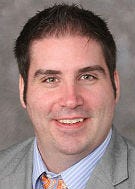Health Care Trends, Opportunities and Challenges
NetServe Systems' Abdi Ahmed, Concierge Core Services' Clark Atwood and WheelHouse IT's Chris Johnson preview their session at the Channel Partners Conference & Expo.

 **Editor’s Note: Register now for the Channel Partners Conference & Expo, the gathering place for the technology services community, April 10-13, at Mandalay Bay in Las Vegas.**
**Editor’s Note: Register now for the Channel Partners Conference & Expo, the gathering place for the technology services community, April 10-13, at Mandalay Bay in Las Vegas.**
Though health care is nearly 20 percent of the U.S. economy, it’s a been a tough market for partners to crack.
It’s highly regulated, very fragmented and technologically complex. But innovation and reform have created opportunities for MSPs, agents and more — from big data to cybersecurity, and everything in between.
 During this Channel Partners Conference & Expo concurrent education session titled, “The Market Will See You Now,” Abdi Ahmed, president/CTO of NetServe Systems; Clark Atwood, president of Concierge Core Services; and Chris Johnson, director of compliance and security services at WheelHouse IT; will talk about key opportunities and trends that are driving this dynamic market.
During this Channel Partners Conference & Expo concurrent education session titled, “The Market Will See You Now,” Abdi Ahmed, president/CTO of NetServe Systems; Clark Atwood, president of Concierge Core Services; and Chris Johnson, director of compliance and security services at WheelHouse IT; will talk about key opportunities and trends that are driving this dynamic market.
In a Q&A with Channel Partners, Ahmed, Atwood and Johnson give a sneak peek into the information they’ll share with partners.
Channel Partners: What are some of the challenges solution providers face when trying to crack the health-care market?
Abdi Ahmed: The biggest challenge in cracking the health-care market is that it is highly overregulated (and), as a result, medical professionals are reluctant in doing business with service providers that they don’t know well or are not properly vetted.
Clark Atwood: Industry terminology, knowledge of compliance requirements (and) group-buying organizations or associations may have some buying controls.{ad}
 Chris Johnson: There really [aren’t] a whole lot of challenges anymore to crack the health-care market; the challenges are once you are selling or providing services [to] the health-care market. Just like any regulated industry, health care comes with a lot of responsibility and regulatory requirements tied to protecting ePHI (electronic patient health information). It is vague in many ways on how to meet regulatory compliance, and the penalties, fines and possibly even criminal charges can close the doors of a medical practice. Once you understand the ins and outs of HIPAA (Health Insurance Portability and Accountability Act) compliance and have done your due diligence to get your own business into a place of compliance, then it is all doable.
Chris Johnson: There really [aren’t] a whole lot of challenges anymore to crack the health-care market; the challenges are once you are selling or providing services [to] the health-care market. Just like any regulated industry, health care comes with a lot of responsibility and regulatory requirements tied to protecting ePHI (electronic patient health information). It is vague in many ways on how to meet regulatory compliance, and the penalties, fines and possibly even criminal charges can close the doors of a medical practice. Once you understand the ins and outs of HIPAA (Health Insurance Portability and Accountability Act) compliance and have done your due diligence to get your own business into a place of compliance, then it is all doable.
CP: What are some of the key trends taking place in health care that solution providers need to know?
AA: Four years ago, if I had suggested to a doctor that he or she needs to put [his or her] data in the cloud, they would look at me as if I’m from another planet. Today, if I don’t talk to them about the cloud, they think something is wrong with me and my presentation. The rate at which cloud services are being adopted in the health-care industry is just amazing. It is very hard to visit a practice that doesn’t have a cloud-based EMR/EHR.
CA: Consolidation has been going for some time. This drives economies of scale in the industry. So there are fewer and fewer small and medium opportunities.
The industry is still trying to balance compliance requirements with flexibility. Regulations are sure to change, so now they are starting to understand that the choices they make today need to be flexible with the political changes of tomorrow.
Someday the tide will turn back to …
… patient experience instead of meeting a ton of new bureaucratic red tape. They don’t want to be caught flat-footed when the tide changes to customer service again.
CJ: Not sure they are necessarily new, but connected devices (Internet of Things) is now in desperate need of security. Locking down how medical devices are connected to the network and who has access to them is of increasing concern. Personal health apps and medical apps in general are also becoming commonplace.
CP: Can you give some examples of key opportunities for solution providers in health care?
AA: Because this is such a regulatory-intensive industry, doctors are interested in streamlining services, and making sure that they meet federal and state requirements — which are constantly changing. That creates a huge opportunity for service providers who are well versed with HIPAA and meaningful use requirements.
CA: Centralization is key. This means opportunities in centralized communications, collaboration, storage and analytics. There is a strong push for more outsourcing of things like servers, software and data centers in general.
 There are still some legacy apps that need attention like fax. Management of communication and data is the critical backbone in health care. Do it securely, effectively and maybe in real time.
There are still some legacy apps that need attention like fax. Management of communication and data is the critical backbone in health care. Do it securely, effectively and maybe in real time.
CJ: Opportunities are tied back to the key trends — security is key and not specific to health care, but across the board. Medical practices and hospitals, etc., are short resources to truly support and secure their environments, and the market is in desperate need of those that can accommodate and support them.
CP: Is there revenue to be gained by entering the health-care market? How?
AA: Yes, there are big revenue opportunities in (the) health-care market because of the changing nature of privacy-related regulations. The hardest thing in this industry is getting the opportunity to sit down with a physician who only has five minutes to listen and then convince them you are their guy.{ad}
CA: Like any industry today, you simply don’t just enter and try and take on clients. You need to know how to deliver structured, outcome-based solutions. It is getting a lot harder for the commodity sales representatives that pitch on price.
Costs are high and there is a push for lower cost, but lowering cost without a business benefit to tie to it is sales suicide. If you are not part of the (business) solution, you are not going to get very far or for very long.
CJ: Like any market that is mature, there is money to be made, but the approach with health care is to not try and take it all on at once. It has verticals within the vertical — targeting pediatrics versus ophthalmology or taking on two or three specialties. Another way is to provide a specific product or service that you can optimize for health care — secure messaging or phone system services, etc.
Read more about:
AgentsAbout the Author(s)
You May Also Like


